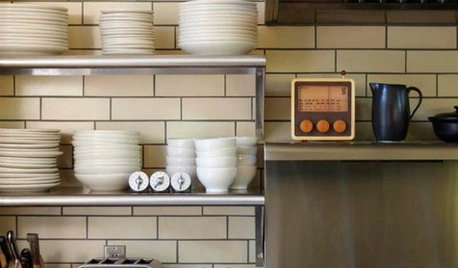buying my own 'stuff'
ae2ga
13 years ago
Related Stories

FEEL-GOOD HOMESimple Pleasures: 10 Ideas for a Buy-Less Month
Save money without feeling pinched by taking advantage of free resources and your own ingenuity
Full Story
HOME TECHBuild a Smarter Kitchen Now With Gadgets You Already Own
Technology can improve your kitchen's efficiency for next to nothing — just look to your old phone or tablet
Full Story
FALL GARDENINGBe Your Own Wildflower Nursery
Gather seeds from your garden in fall, and you'll have a selection of plants for next year — without spending a dime
Full Story
FARM YOUR YARD6 Things to Know Before You Start Growing Your Own Food
It takes time and practice, but growing edibles in the suburbs or city is possible with smart prep and patience
Full Story
KITCHEN DESIGNWhy Your Kitchen Wants Its Own iPad
Cooking-school gateway, recipe database, foodie networking ... an iPad in the kitchen has uses far beyond being a message center
Full Story
KITCHEN DESIGNCreate Your Own Checklist for a Well-Stocked Kitchen
Personalize the kitchen with your own must-haves from our list of top cooking tools, small appliances, pots, pans and more
Full Story
LIFESimple Pleasures: A Room of Your Own
Free up space for your own creative or meditative pursuits, and your dreams may have freer rein too
Full Story
HOUSEKEEPINGChoose Your Own Spring Cleaning Plan
Instead of trying to do it all, pick one of these six cleaning approaches that’s right for you now
Full Story
HOUSEKEEPINGBaking Soda: The Amazing All-Natural Cleanser You Already Own
Battle grime, banish odors and freshen clothes with this common nontoxic cupboard staple
Full Story
EDIBLE GARDENSHow to Grow Your Own Sweet Summer Crops
This guide will help any gardener get started on growing the freshest warm-season veggies and berries for summer
Full Story









User
steve_o
Related Professionals
Beavercreek Kitchen & Bathroom Designers · Feasterville Trevose Kitchen & Bathroom Remodelers · Blasdell Kitchen & Bathroom Remodelers · Creve Coeur Kitchen & Bathroom Remodelers · Elk Grove Village Kitchen & Bathroom Remodelers · Linton Hall Kitchen & Bathroom Remodelers · Mesquite Kitchen & Bathroom Remodelers · Ogden Kitchen & Bathroom Remodelers · Overland Park Kitchen & Bathroom Remodelers · Southampton Kitchen & Bathroom Remodelers · Bloomingdale Interior Designers & Decorators · Sweetwater Interior Designers & Decorators · Hillsboro General Contractors · Lakewood Park General Contractors · Perrysburg General Contractorsae2gaOriginal Author
User
ae2gaOriginal Author
homebound
ae2gaOriginal Author
User
steve_o
User
homebound
davidro1
ae2gaOriginal Author
davidro1
bill_g_web
bill_g_web
homebound
ae2gaOriginal Author
bill_g_web
ae2gaOriginal Author
marcolo
ae2gaOriginal Author
steve_o
ae2gaOriginal Author
kfox1101
ae2gaOriginal Author
sas95
ae2gaOriginal Author
talley_sue_nyc
ae2gaOriginal Author
sherwoodva
ae2gaOriginal Author
dianalo
sas95
californiagirl
ae2gaOriginal Author